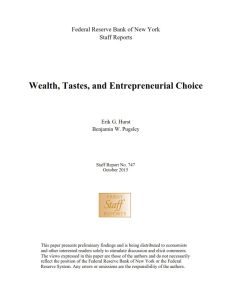Join getAbstract to access the summary!

Join getAbstract to access the summary!
Erik G. Hurst and Benjamin W. Pugsley
Wealth, Tastes, and Entrepreneurial Choice
Federal Reserve Bank of New York, 2015
What's inside?
Is it worthwhile for government to subsidize small businesses?
Recommendation
Small-business owners tend to earn less than they would as full-time employees, but most of them prefer entrepreneurship for its nonmonetary rewards and thus don’t mind taking a pay cut to engage in such ventures. This original research by macroeconomists Erik G. Hurst and Benjamin W. Pugsley explores this mind-set and its implications for policy makers looking to stimulate employment and innovation through small-business subsidies. While informative, the report is a heavily technical read intended for a professional audience. Nonetheless, getAbstract recommends it to government policy makers and economists, as well as to entrepreneurs.
Summary
About the Authors
Erik G. Hurst is an economics professor at the University of Chicago, and Benjamin W. Pugsley is an economist at the Federal Reserve Bank of New York.

















Comment on this summary